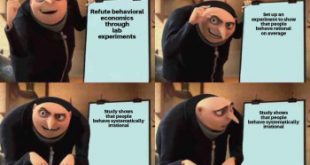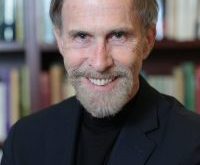Flash dance non plus ultra [embedded content]
Read More »On tour
Visiting Stockholm yours truly, of course, takes the opportunity to spend some time with daughter who lives there. Picture taken eighteen years ago at our summer residence in Blekinge.
Read More »Der Alptraum der DDR-Führung: Udo Lindenberg erhält Bundesverdienstkreuz
[embedded content] Panikrocker Udo Lindenberg hat das Bundesverdienstkreuz bekommen. Glückwunsch!
Read More »The primary problem with mainstream economics
The primary problem with mainstream economics Jamie Morgan: To a member of the public it must seem weird that it is possible to state, as you do, such fundamental criticism of an entire field of study. The perplexing issue from a third party point of view is how do we reconcile good intention (or at least legitimate sense of self as a scholar), and power and influence in the world with error, failure and falsity in some primary sense; given that the primary...
Read More »Die schwarze Null ist völliger ökonomischer Unsinn
Die schwarze Null ist völliger ökonomischer Unsinn Jürgen Zurheide: Da kommt natürlich sofort die Frage, wie wollen Sie das dann finanzieren? Wir tragen die schwarze Null wie eine Monstranz vor uns her, wollen Sie die opfern? Sebastian Dullien: Die schwarze Null ist völliger ökonomischer Unsinn. Das hat überhaupt keinen Sinn und keinen Zweck. Zurzeit zahlt Deutschland für seine Staats-schulden keine Zinsen, wenn es neue Schulden aufnimmt. Gestern waren zum...
Read More »Der Mord an Jamal Khashoggi wird die saudischen Führer immer verfolgen
Der Mord an Jamal Khashoggi wird die saudischen Führer immer verfolgen Hatice Cengiz war mit dem saudischen Journalisten Jamal Khashoggi verlobt. Am 2. Oktober 2018 fuhren sie zum saudischen Konsulat in Istanbul, wo Khashoggi ein Dokument abholen wollte. Hatice wartete vor dem Konsulat, doch Jamal kam nicht heraus. Jamal Khashoggi wurde von einem saudischen Tötungskommando ermordet. Die Menschenrechtsexpertin Agnès Callamard hat den Mord als...
Read More »Verhaltensökonomie
Unser Umgang mit Fremden ist heute durch die Institutionen des Marktes und des Geldes geprägt – und die abstrakte “Sprache des Preises”. Diese Institutionen lassen sich jedoch nur begrenzt in die Menschheitsgeschichte zurückspiegeln. Unsere Wirtschaftsform ist das Ergebnis massiver gesellschaftlicher Veränderungen innerhalb weniger Jahrhunderte. Kapitalismus entsteht im Kopf: nicht als Instinkt, sondern als Idee. Unter anderem durch Gelehrte, die auch die moderne...
Read More »What’s wrong with Krugman’s economics?
What’s wrong with Krugman’s economics? Krugman writes: “So how do you do useful economics? In general, what we really do is combine maximization-and-equilibrium as a first cut with a variety of ad hoc modifications reflecting what seem to be empirical regularities about how both individual behavior and markets depart from this idealized case.” But if you ask the New Classical economists, they’ll say, this is exactly what we do—combine...
Read More »Prag — Tor zur Freiheit
Prag — Tor zur Freiheit [embedded content]
Read More »Adults in the room
Adults in the room [embedded content]
Read More » Lars P. Syll
Lars P. Syll






